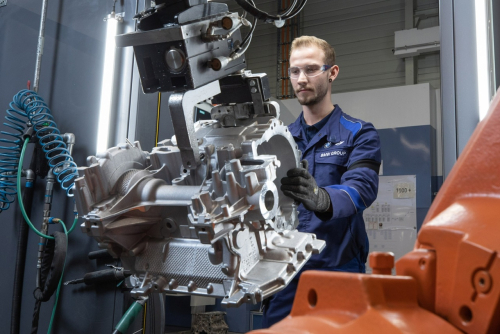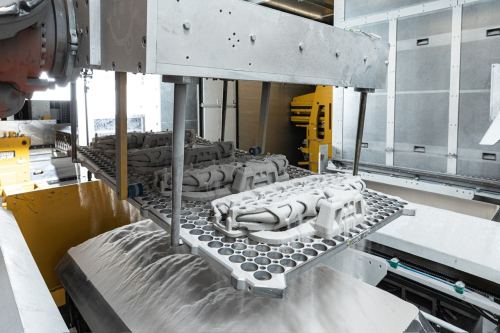Of this, some €500 million has been used for the plant’s expansion to cover electric mobility. Annual production capacity for fifth-generation and sixth-generation aluminum housings increases by around 30%. The new model generation will therefore benefit from the know-how of the company’s largest component manufacturing site.
Manufacturing the central housing for the sixth-generation drive technology in the Neue Klasse represents a further step in the plant’s transformation to electric mobility.
The new production hall will be spread over three levels. In future, production will take place here on two production lines covering an area of 12,000 square meters using the injector casting process. Injector casting ensures that parts are cast with optimum mechanical properties. It has the additional effect of shortening the cycle time and, as a result, reducing energy consumption considerably while also cutting carbon emissions due to the lower casting temperature. This method results in reduced consumption of resources too as it requires less return material.

Production of central housing
In January of this year, the BMW Group purchased a plot of land directly adjacent to Plant Landshut that is about 30,000 square meters in size and has been earmarked for further expansion of production in the future. This strategic acquisition is a key element in the plant’s ability to respond to future demand. A final decision on how exactly the new land is to be used will be made at a later date.
Besides the major expansion of production space in the light metal foundry, the plant is also investing in 3D printing technology for manufacturing its sand cores. These sand cores are deployed in six different cylinder head variants for production of BMW engines worldwide. The plant makes up to 4,500 units on 17 printers daily in a large-scale 3D printing process. The sand cores are moulded by printing them layer by layer on a print head system using emission-free and environment-friendly inorganic binders.

3D printing sand cores
As well as manufacturing components for the company’s all-electric models, Plant Landshut also stands out with its highly flexible production system. The site in Lower Bavaria continues to manufacture propeller shafts, crankcases, cylinder heads and engines on a demand-driven basis for the ICE models in the product portfolio.
In 2023, BMW Group Plant Landshut produced a total of around 3.6 million cast components, 430,000 plastic components for vehicle exteriors, more than 300,000 CFRP parts, 286,000 cockpits, 1.4 million propeller shafts and 20,000 special engines. Cockpits for the BMW 5 Series, BMW 6 Series, BMW 7 Series and BMW iX and instrument panels in base, artificial leather, leather, microfibre and fabric trim are made in Landshut, together with structural components, roofs and bonnets made from CFRP, glove compartments, bumpers, spoilers and trim elements.
As well as Plant Landshut, the BMW Group’s in-house component manufacturing network also includes the facilities in Dingolfing, Wackersdorf, Munich, Leipzig, Berlin and Shenyang (China). Together these supply components to the company’s Digital, Powertrain, Driving, Exterior & Interior and High-voltage battery & Charging technology clusters. Purchasing, Development and Production work closely with one